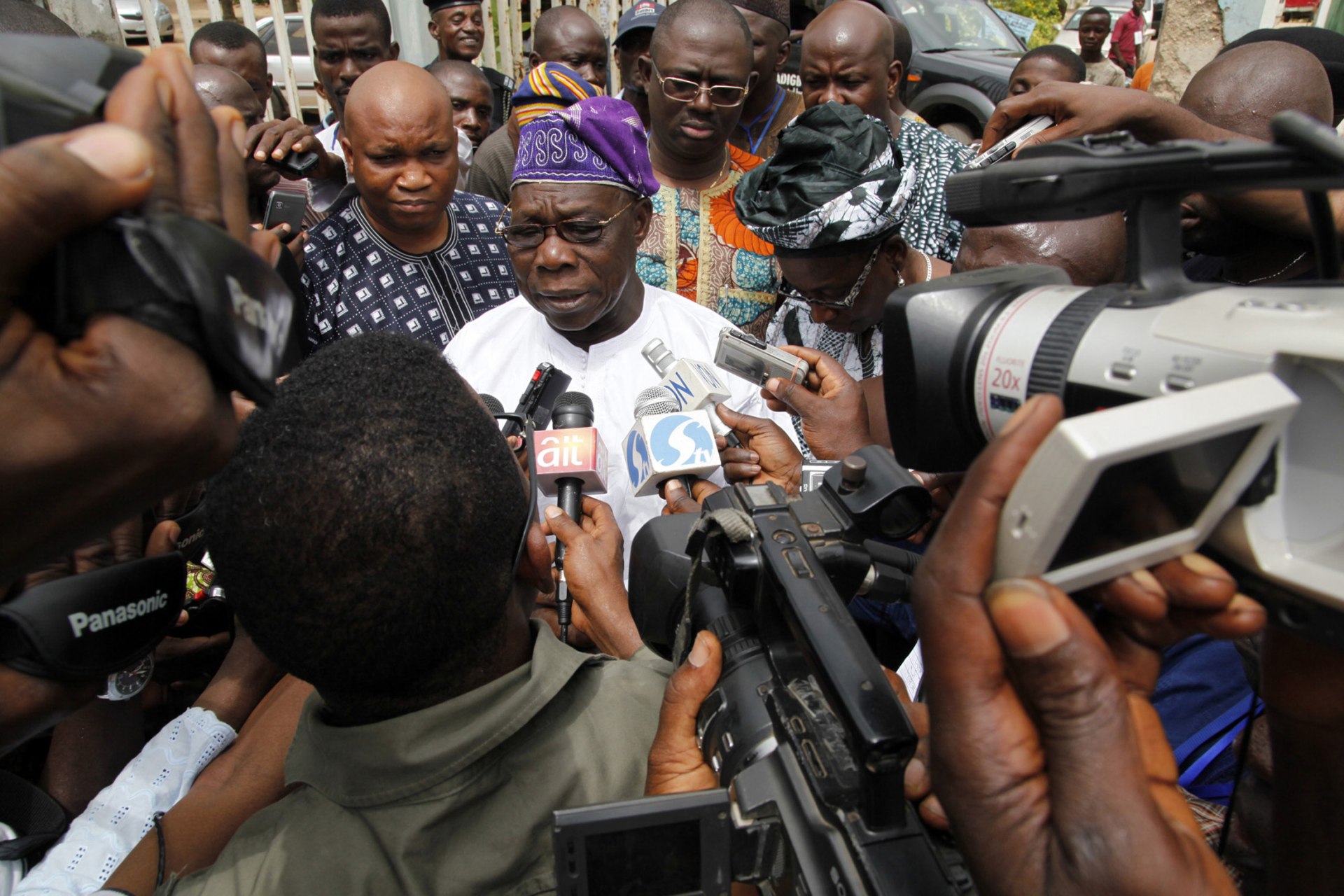Former President Obasanjo Argues for the Unity of Nigeria

By experts and staff
- Published
By
- John CampbellRalph Bunche Senior Fellow for Africa Policy Studies
Against a backdrop of growing calls for ethnically based separatism, including in former President Olusegun Obasanjo’s native Yorubaland, the former president in a speech laid out the arguments for maintaining Nigeria’s unity—though not at any cost. Speaking June 9 in the Yoruba heartland city of Abeokuta, where he lives in retirement, Obasanjo argued that Nigerians will fare better staying together: “it is better for Nigeria to remain as one indivisible nation than for each tribe to go its separate way.” The summary of his argument: “I am a strong believer of one Nigeria, but not one Nigeria at any cost, but one Nigeria where every Nigerian can feel proud that he or she has a stake in this country.”
Power—that of the Nigerian state and of individual Nigerians—is the heart of his argument. Disintegration would result in successor “weak republics.” In Yorubaland, advocates for separatism look to the creation of an independent, ethnically based Republic of Oduduwa. Obasanjo argues that “if all that we have is Republic of Oduduwa for those who say so, members of that country will be diminished compared to being citizens of Nigeria.”
Arguments for separatism center on the big three ethnic groups: the Hausa-Fulani, predominant in the north; the Igbo in the southeast; and the Yoruba in the southwest. Together they are probably a majority—though small—of Nigeria’s population, and they are by no means contained exclusively in the region where they predominate. In addition to the big three, some three hundred other ethnic groups together approach being half of the population, and they are to be found across the country. How to balance the big three and the minorities has been an issue in Nigeria’s governance since the colonial period. The consensus has been that this diversity can best be managed within a federal republic, of which only the form, not the substance, has ever been achieved. Nevertheless, Obasanjo asks what the future would be for the minorities if Nigeria were to break up into three republics dominated respectively by one of the big three. Obasanjo also reminds his audience of the chaos and bloodshed that resulted elsewhere when the genie of ethnic rivalry escaped from the bottle because of the disintegration of a larger state. He cited specific bloody conflicts: India and Pakistan, Sudan and South Sudan, and the civil wars and other conflicts among the successor states of Yugoslavia.
In his speech, Obasanjo acknowledged that Nigeria is severely challenged: “any Nigerian who does not feel concerned about the challenges of this country is a human being without being human.” And, “the fact that we are not making Nigeria what God wants it to be is not the fault of God but our fault, particularly the leaders.” But, for Obasanjo, the solution is to work for a united Nigeria, not its disintegration.
Obasanjo has presented the central, credible arguments for the unity of Nigeria. Some of his arguments, especially with respect to the decline of state and elite power, are reminiscent of those advanced in other parts of the world by opponents of secession, such as in Catalonia or Scotland or even among those opposed to the departure of the United Kingdom from the European Union. (Often separatism is a popular movement opposed by entrenched elites.) However, Obasanjo’s focus on the dangers of ethnicity and his invoking of God is more characteristic of Nigeria than elsewhere.
Throughout his career, Obasanjo has been a Nigerian nationalist. He played a prominent role in the 1967-70 civil war in which the nationalists—for whom he fought—defeated predominantly Igbo efforts to establish an independent Biafra. He was military ruler of Nigeria from 1976 to 1979 and subsequently an ostensibly civilian president from 1999 to 2007 after the nominal restoration of civilian, democratic government. During his civilian presidency, Nigeria played a highly positive role in Africa, promoting a democratic trajectory and ending conflicts. After he left office in 2007, his ambitions to remain president having been thwarted, he retained political influence, especially with the Peoples Democratic Party (PDP). But, that party is now in opposition, and Obasanjo’s relationship with the PDP since departing office has been fractious. He left the party in 2015 and started a new political coalition, though it has been a bit-part player in Nigerian politics. Nevertheless, he retains some political influence, and many Nigerians will listen to what he has to say.
This publication is part of the Diamonstein-Spielvogel Project on the Future of Democracy.
